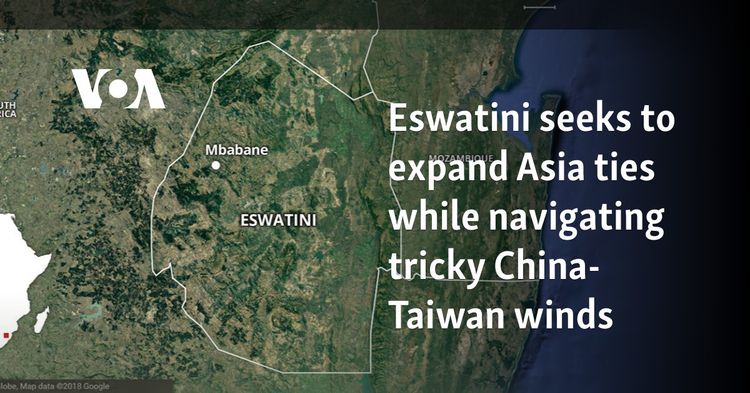Eswatini seeks to expand Asia ties while navigating tricky China-Taiwan winds

Eswatini, previously known as Swaziland, is the only African country that still has official ties with Taiwan, a move that has not been well received by China. Despite this, Eswatini is becoming more involved in trade with China, so it must be cautious in expanding its economic relationships with other Asian countries.
Eswatini has been working on forging closer relationships with South Korea, Singapore, and Bhutan, which some may see as a shift away from China, its main trading partner in Asia. In the year 2022, the country imported over $109 million worth of goods from China.
However, Alpheous Nxumalo, who speaks on behalf of the government, disagreed with this conclusion. He explained that diplomacy is constantly changing and is based on a country's interests. He stated that Eswatini's decision to prioritize building relationships with other Asian countries was a carefully thought-out strategic move that aligns with the kingdom's best interests.
"We are building connections with many countries," Nxumalo stated. "Geopolitics doesn't just happen in one place. It is shaped and impacted by different parts of the world. As the kingdom of Eswatini, we aim to have a presence and make an impact in areas where geopolitics is active - whether it be through trade, diplomacy, or political processes. We want to be involved in these activities."
Therefore, Eswatini is considered a friend to all and an enemy to none, based on our key foreign policy principles.
By being friendly with everyone, Eswatini has been able to keep good relationships with both China and Taiwan. Even though China has tried to convince Eswatini to end its connections with Taiwan, Eswatini has managed to stay neutral.
China has made a number of warnings to Eswatini about possible actions, but so far, they have not taken any concrete steps to follow through on these threats.
Almost 60% of the population in Eswatini is living in poverty. The country's economy was negatively impacted by the COVID-19 pandemic, which was then followed by a series of protests that resulted in the destruction or harm of numerous businesses.
Mavela Sigwane, in charge of transformation at the Federation of Eswatini Business Community, mentioned that the outreach missions to South Korea, Singapore, and Bhutan go beyond just diplomacy. They have the chance to bring about important economic advantages.
"We are thrilled about the Korea agreement that has been finalized," Sigwane exclaimed. "This will provide numerous opportunities for our local businesses to access the potential benefits in Korea."
The Signwane referenced by Korea is a new pledge from South Korea to invest over $20 billion in aid and development projects in Africa.
King Mswati of Eswatini praised South Korea for their dedication and extended an invitation for South Korean companies to consider investing in Eswatini.
According to political expert Sibusiso Nhlabatsi, Eswatini's recent choice to establish economic connections with non-traditional Asian allies shows that the country is willing to consider new partnerships outside of its usual Western relationships.
"Swaziland aims to gain advantages by positioning itself as a more adaptable and multi-faceted player in the Asian region," Nhlabatsi explained. "The country's strategic relationships with China, Taiwan, and other new partners show that even though Swaziland may be small in size, it remains autonomous in its foreign policy decisions instead of simply following the lead of bigger nations."
Experts believe that the growth in trade, additional chances for investment, and advancements in technology that come with these new partnerships could help to broaden Eswatini's economy. This would decrease the country's reliance on just one market.









































